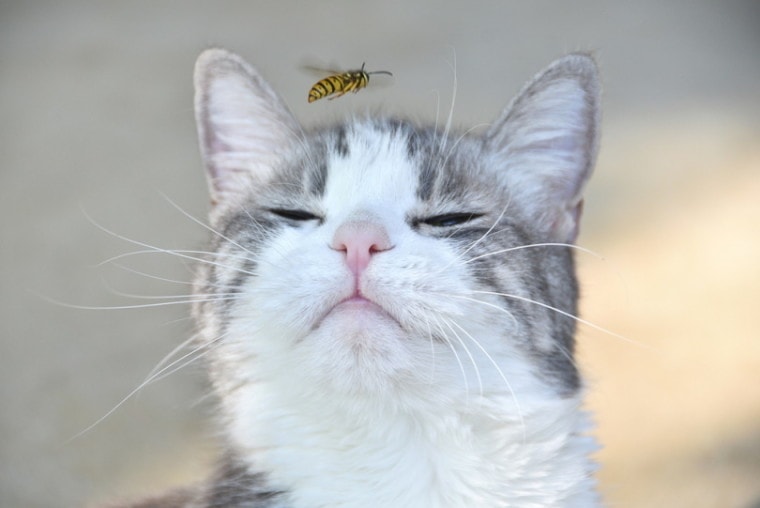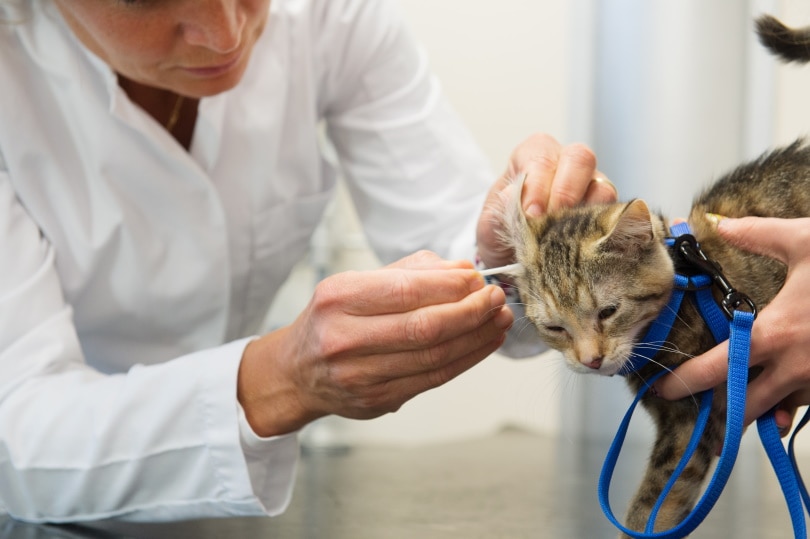
Insect stings are relatively common in cats. Cats like to play, and bugs are often tempting prey. If your cat is playful and curious, he might stick his paw too close to a bee or wasp and get stung. In most cases, cats will heal from a bee sting on their own and will need only minor first aid. However, some cats have life-threatening allergic reactions to being stung. Monitor your cat for signs of allergic reactions and consider contacting a vet.
Let’s get into exactly how to handle a situation such as this.
Types of Insect Stings
Bees and wasps both sting cats frequently. They may look similar, but their stings are very different. Wasps have straight stingers that don’t detach when they sting. This means that one wasp can sting again and again.
On the other hand, a bee’s stinger detaches during a sting. Each bee can only sting once, but the stinger will be left in your cat’s skin. It might continue to pump venom for several minutes, so removing the stinger quickly will reduce pain and swelling.

Signs of Bee Stings
Cats often try to hide pain, and it might not be obvious that a bee sting has occurred. Bee stings are more common in younger cats and cats with access to the outdoors, but they can happen inside or outside and to older or younger cats on occasion.
Cats are usually stung around their face and paws. They might limp or paw and scratch at the sting. Look for a small, swollen bump where the sting took place.
Bee Sting First Aid

As soon as you realize your cat has been stung, remove him from the area and find someplace safe to evaluate and treat your cat. Although one sting is unlikely to cause a severe reaction, other bees or wasps might be nearby. Most serious insect bite reactions come from being stung multiple times.
If your cat gets stung by a bee, it is important to remove the stinger quickly. Scrape the stinger out using the edge of a driver’s license or credit card. Don’t pinch the stinger out with tweezers—that can crush the venom sac, worsening the sting.
After the stinger is removed, evaluate your cat’s injuries. Search your cat’s fur to make sure there are no other insect stings. Monitor your cat to watch for a more severe allergic reaction. Most insect stings don’t require veterinary care. Consider visiting a vet immediately if your cat has been stung several times or if the insect sting occurred inside of the mouth. It’s likely worth a call to your vet regardless of where or how many times your cat was stung.
If your cat is only experiencing minor swelling, a cold compress will help reduce side effects. Frozen vegetables, an ice pack, or a cold towel applied to the site will help reduce swelling and soothe the pain.
Diphenhydramine/Benadryl can reduce swelling and minimize allergic reactions in cats, but you should always be cautious in giving your cat over-the-counter medicines. Read the label carefully to make sure there are no pain medications mixed in with your medicine. Many pain medicines are toxic to cats. Dosage also varies from cat to cat. PetMD recommends you give your cat 1 mg of Benadryl per pound of your cat’s weight in the case of insect bites. If you have any concerns about giving your cat over-the-counter medicines, contact your vet for specific advice or skip the medicine.
Even if the sting seems minor at first, monitor your cat for signs of severe reactions. If signs of a severe allergic reaction occur, contact a vet immediately.
Severe Reactions to a Sting
Most of the time, bee stings only result in minor swelling and discomfort for your cat. In rare cases, a sting can lead to an extreme reaction called anaphylactic shock.
Early Warning Signs:
Later Signs:
If your cat experiences signs of anaphylactic shock, contact your vet immediately and bring your cat in for treatment. Any signs of anaphylactic shock should be taken seriously. Anaphylactic shock is often fatal if it is not treated promptly.
Preventing Future Insect Stings

Bee stings are unlikely to be serious for cats, but there are also measures you can take to make them less likely in the future. If you allow your cat outside, look for hives around your house. Having a professional remove nests or hives will make your area safer. If you see your cat playing with a bug, check to make sure it isn’t harmful. If your cat is attempting to play with a bee or wasp, immediately remove your cat from the situation.
Chemical insect killers and repellents can reduce insect activity in your area, but they should be used with caution or not at all. Chemical insect killers are often toxic to cats and can cause severe signs. Consider using other methods of insect control, especially in areas that your cat can access.
Final Thoughts
Although some insect stings can be serious, most cats will heal rapidly following a bee sting. Administering basic first aid can help your cat be more comfortable after being stung. Don’t panic after a bee sting, but do treat the sting seriously. Knowing the signs of a serious reaction may save your cat’s life.
Featured Image Credit: Jesse Franks, Shutterstock







